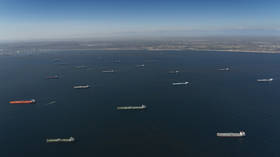Russia’s crude oil exports drop 8% in January-August

Russia’s crude oil exports dropped by 7.9 percent year over year in the period January to August, according to Russian federal customs data cited by local cargo analytics outlet SeaNews.
For most of the period through August, Russia was part of the OPEC+ agreement to curtail supply to the market, except in March and early April, when Russia and Saudi Arabia disagreed on how to manage oil supply to the market when demand was crashing due to the pandemic. The current production cuts began in May 2020 and are much deeper than in the previous deal.
Also on rt.com OPEC+ crude production cuts could be extended – PutinRussia’s crude oil exports also dropped in terms of value due to the slump in oil prices. Between January and August, the value of Russian crude oil exports plunged by 38.9 percent compared to the same period last year, to $48.8 billion, according to data from the Russian federal customs service.
Currently, Russia’s economy is suffering the consequences of the oil price crash that it helped create with the temporary rift with its OPEC+ partner Saudi Arabia. Russia’s oil income shrank as a result of the plunge in oil prices.
Due to the restrictions under the OPEC+ deal, Russia plans to export 16.4 percent less crude oil this year compared to 2019, Russian Energy Minister Alexander Novak said at the budget committee at Russia’s Parliament last week.
Crude oil production is expected to drop by 10 percent in 2020 from 2019, Novak said, adding that output could return to the levels before the pandemic by 2023, but this would depend on global oil demand and the OPEC+ agreements.
OPEC+ is set to ease the current cuts by 2 million barrels per day (bpd) as of January, but weak demand and rising supply from exempt OPEC member Libya could derail those plans.
Russian President Vladimir Putin said last week he is not ruling out OPEC+ delaying the easing of the cuts, or even making further reductions.
“We are of the opinion that nothing needs to change right now. However, we are not ruling out either maintaining existing production limits or not lifting them as soon as we had intended earlier. And if necessary, we will make further reductions. But currently we do not see the need,” Putin said, as carried by the Kremlin.
This article was originally published on Oilprice.com














